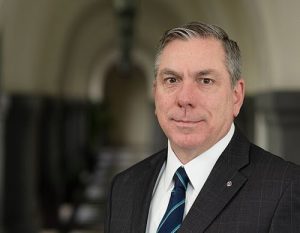
What did you do before becoming supreme master of the Knights of Columbus?
SUPREME MASTER MICHAEL MCCUSKER: I was a criminal prosecutor, serving as an assistant district attorney for 23 years in Memphis, Tennessee, where I handled all types of crimes, from murders to drug cases to rapes to vehicular homicides — anything you could imagine, I handled. And from 1985 to 2007, I served in the military.
I joined the Army at 17 because I needed money for college. My dad actually had to sign for me; I was too young to do it on my own. I enlisted, and I was a water purification specialist. It gave me some unique opportunities. I got to go to Egypt as a young man in the Army, and then in time I went to college, where I was commissioned as a second lieutenant in the field artillery. I was a field artillery officer in a battery, then a battery commander, and then I moved into intelligence; I was a battalion and brigade intelligence officer.
I was sent to Afghanistan in 2005. That was my retirement gift from the Army. I hit 20 years in Afghanistan, but I couldn’t go home. I had to finish my tour, so I ended up staying longer than the necessary 20 years. But when I went to Afghanistan, I transitioned to infantry. I was a combat advisor to the Afghan army, so I ran patrols with the Afghan army for a year in northern and western Afghanistan.
Could you talk a little bit about your spiritual life as a Catholic in a war zone?
SUPREME MASTER MICHAEL MCCUSKER: I missed the first Gulf War, and when I was a foolish young man, I lamented that fact. I said, “Lord, you prepared me to be a soldier, and now war has come and gone, and I didn’t get to be involved with it.” Well, God takes his time answering prayers. And that was a very foolish prayer. No man wants to go to war. But a young, stupid man thinks that he has to go to prove himself somehow. When the good Lord got around to answering that prayer, I had a wife and two small children, and I was well established in a law career. Then he decided it was time for me to go to war. It wasn’t the best timing, but it was a lesson in humility. It was also a lesson in being careful what you pray for!
I tried to use that 15 months of my life to understand, “Why now, God? Why are you doing this now?” I took this approach going into it — this would be my 40 days in the desert, though it was a lot longer than 40 days. But I was going to a desert, going away from my life. Most war is 99% boredom and 1% sheer terror. You have a lot of time on your hands, and how you use that time is important. So, I said, “I’ll treat this as my 40 days in the desert to discern a deeper love of God.” What I realized by the time I ended my journey is that it wasn’t my 40 days in the desert — I had spent nearly 40 years in that desert, and God used the war as a way to lead me out of the desert of my life.
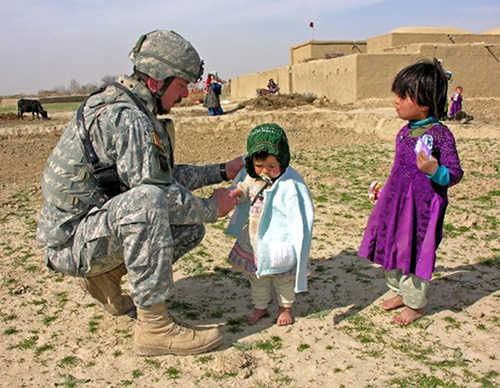
Did you have access to Mass and the sacraments during your deployment?
SUPREME MASTER MICHAEL MCCUSKER: The challenge for us in the field was that the number of Catholic chaplains continually decreased. I would only see a Catholic chaplain every six weeks, if a helicopter happened to bring one to my area. We very seldom had Mass. But we became trained and certified to lead Eucharistic prayer services, and we would get the Eucharist and bring it to our camp. Not the most ideal situation. The Lord lived in my footlocker a lot. But every Sunday our small group of Catholics would try to have a Eucharistic liturgy. We managed to celebrate Holy Week without a priest; we managed to have an Easter Sunday without a priest.
My friend, who is now a Catholic priest in Texas, used to run those Catholic services, but he went home six months before I did. He said to me, “I want you to take over running the Catholic services.” I said, “I’m not worthy to do this. I mean, I’m as big a sinner as anybody. I shouldn’t be able to do this.” But he told me, “Well, I need you to do this.”
I was reading three chapters of the Bible every day, trying to work my way through it. It just happened that the next day I read the chapter where God chose Saul to be the first king of Israel. And in the footnote was a comment about how Saul was imperfect, but that demonstrated how God brings about perfection through imperfection. I knew that was the sign that I would lead the Catholic community in northern Afghanistan. Finally, toward the end of my tour, God blessed us with a German chaplain, Father Georg Pützer, who would come out every Sunday night from the German camp. So, during the last few months, I finally got to have Mass every week. It made us appreciate how valuable chaplains are.
As the supreme master, you manage the Fourth Degree. What are Fourth Degree Knights doing today?
SUPREME MASTER MICHAEL MCCUSKER: What the Fourth Degree Knights are doing right now is most important: We are getting ready for the Fourth Degree’s 125th anniversary. The first Fourth Degree exemplification was held Feb. 22, 1900, in New York City — they chose that date because it was George Washington’s birthday. We’re going to have a terrific celebration Feb. 22, 2025, at St. Patrick’s Cathedral in New York City. Cardinal Timothy Dolan, the archbishop of New York, is scheduled to celebrate Saturday evening Mass with Supreme Chaplain Archbishop William Lori.
On the leadership level, we are in the midst of appointing district masters throughout the world who will help lead the Order for the next two years. Additionally, for a long time we haven’t had a solid training program to help the Fourth Degree know how to function in their assembles, so we’ve started a Fourth Degree newsletter that goes out every month. It’s an exciting time. We’re starting to gain momentum to get people engaged in the future so we can build on another 125 years.
Can you say more about the principle of patriotism in the establishment of the Fourth Degree? And what can Knights today do to keep living out this principle and transform their culture?
SUPREME MASTER MICHAEL MCCUSKER: The Knights of Columbus was founded in 1882. They took hold and they were growing, but the more they grew, and the more they had success, the more they faced anti-Catholic attacks. In the United States, there was this idea that you couldn’t be a good American and a good Catholic, that they were incompatible. In the midst of those anti-Catholic sentiments, the Knights formed the Patriotic Degree at the turn of the century to show that we are Catholic, but also good citizens.
Being a Catholic patriot is not so easy these days either. Everywhere you look, the Catholic Church takes the position of morality and gets attacked for it. So, now, more than ever, it is important to demonstrate that we love our faith, but we also love our country. We are not trying to destroy our country; we’re trying to make it better.
In the United States, we deal all the time with a great misunderstanding about the establishment clause of the First Amendment: “Congress shall make no law respecting an establishment of religion.” It’s almost to the point where you can’t say anything religious, or else some people will claim you’re violating the establishment clause. Nowadays, people want to shut down everything that has to do with religion. They want to say you can’t have prayer in school or in a public sector; you can’t support a military program if you’re a church organization, because that violates the establishment clause. Nothing could be further from the truth.
Through the patriotic arm of the Order, Knights can gain a better understanding of their country and their government, so they are equipped to teach others about the truth of their country’s history, their patriotism.
Having Catholics who truly love their country, who are actively living out a love of their homeland, that can do a lot for the transformation of culture.
SUPREME MASTER MICHAEL MCCUSKER: Yes, and there was a time in our country where you and I might have had different political views, but I wouldn’t think you were any less of a patriot. Today, the problem we face is that there are so many people who are quick to believe that their perspective is the only correct one, and they are willing to attack somebody else’s patriotism just because they think differently about how to fight a war, or whom to support in a conflict.
I hope that through the Knights of Columbus and the Fourth Degree, we can understand that, regardless of people’s differences, the most important thing is to love your country and to love your neighbor. That means you don’t stop loving your brothers and your sisters in Christ just because they don’t necessarily agree with everything you think is the correct patriotic point of view. I would love for the Fourth Degree to be a place where we encourage discussion again, where we may agree to disagree, but we don’t diminish each other when we don’t see eye to eye. We have to be very careful to always maintain respect and love for one another even if we disagree.
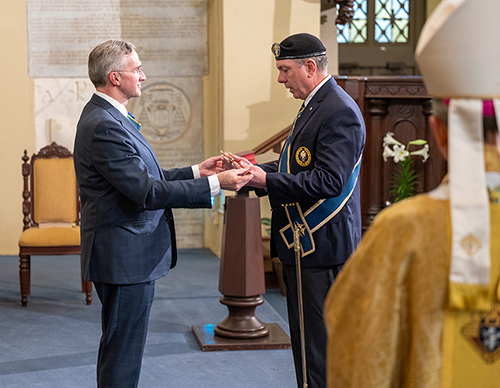
The Knights of Columbus is an international order. This means that Knights are united by this common virtue of patriotism, but individually each is obliged to love their own individual homeland. How can we foster unity and patriotism at the same time?
SUPREME MASTER MICHAEL MCCUSKER: Well, I think you have to look at it twofold. First of all, look at it from the patriotic point of view. As a patriot, regardless of what country you’re from, you should love and support your country. You should be willing to die defending it if necessary. Yet I think you should also look at it in a broader sense. My country is the United States. I’ve got brothers in Canada; their country is Canada. But we’re all members of the Church as well. We’re all called to love and to defend the faith. We all have that in common as Catholic patriots.
Where we sometimes go astray is holding this idea that one country is somehow more important than another. So, by the unity of the Knights, what we can achieve is respect for each member’s country and celebrate the patriotism of all.
What can Knights of Columbus chaplains do to support this principle of patriotism?
SUPREME MASTER MICHAEL MCCUSKER: It would be wonderful for us to find ways to increase the dialogue between lay members of the Knights and their parish priests and bishops, so that we can have a greater understanding of our civic duties as Catholic citizens. Maybe we can even facilitate having seminars, where Fourth Degree faithful friars can help Catholics during election seasons to understand political issues and why they’re important. Our priests can also help Knights understand other ways that we, as Catholic patriots, can be engaged in our community by carrying out corporal works of mercy for veterans who are struggling with homelessness, addiction or incarceration. Because everywhere you look, those numbers are on the increase. By working with our priests, I think the Fourth Degree can get a better sense of where Christ is needed right now, and how we, as patriotic members of the Order, can address those needs.
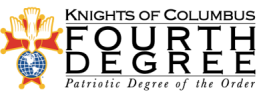
Leave A Comment